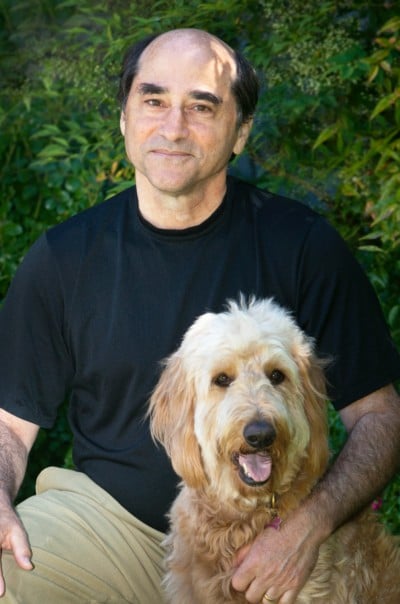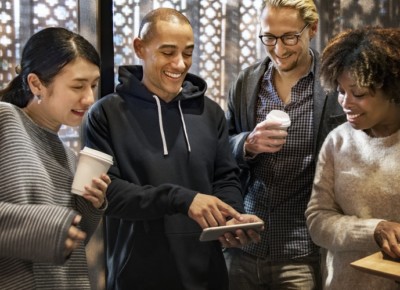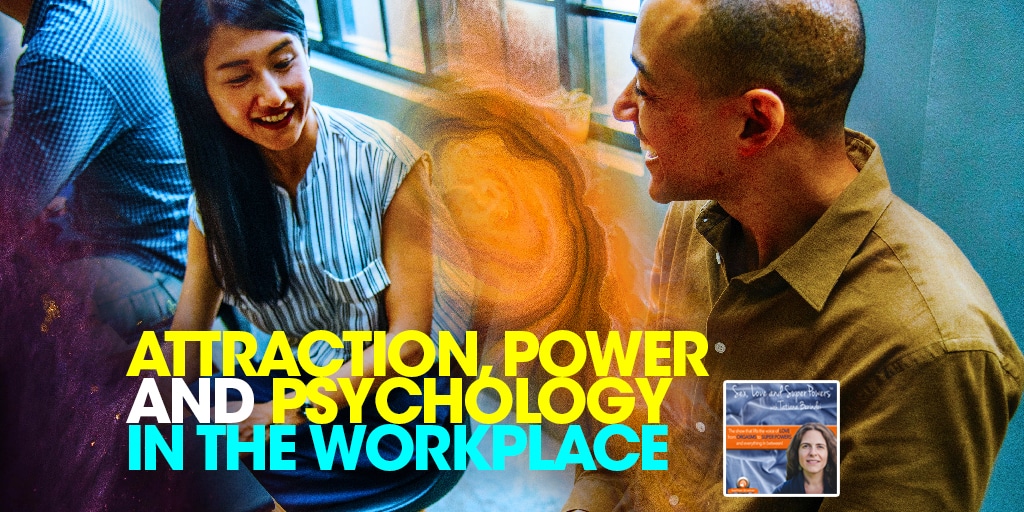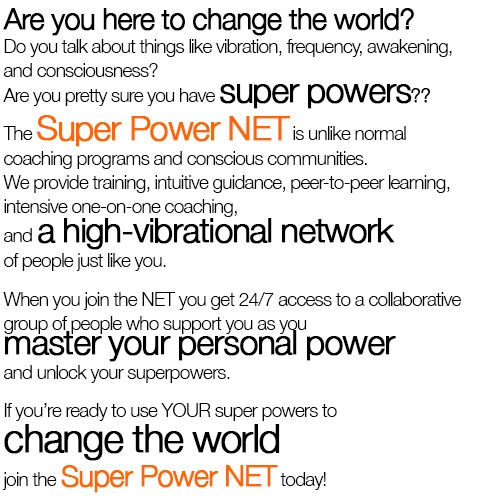
Hello, everyone. Welcome to the Sex, Love, and SuperPowers podcast show. I’m your host, Tatiana Berinde, and today, I am really happy to have with me a friend and collaborator, Glenn Marks. We are going to be discussing attraction, power, and psychology in the workplace. This is going to be a really really good conversation. I’m looking forward to it.
Let me tell you a little bit about Glen. Glen Marks is PhD and an MBA. He has worked as a clinical psychologist for over 21 years in a variety of organizations, ranging from for-profit and not-profit hospitals, the VA, the Department of Defense, and the State of Arizona. With a keen appreciation for the impact of workplace dynamics, his current focus is facilitating psychologically and emotionally healthier workplaces. Places where people can show up, warts and all, and provide the best of them without fear of being judged or belittled.
I’m so happy to have you on the show with us today, Glenn. Thank you for being here.
It’s a pleasure and an honor, Tatiana.
Before we dive into this topic where you and I have been connecting a lot recently around attraction, power, and psychology, especially in the workplace, will you please tell our listeners what your superpowers are?
Gladly. It may be odd for me to start with talking about my golden doodle, Abby, but with all of the time I’ve spent studying over the years and interacting with people, having a dog bestows a certain degree of superpowers on people. Being able to observe and interact with the unbridled enthusiasm and the unconditional love.
Can you say more about how you’re developing a superpower around that? ‘Cause I think you’re right, and I just want to hear more about what it’s pulling out in you and how you’re connecting that to your life, too.

Letting the guard down opens up conversations with people.
Well, part of this connects to another superpower that I’ll mention in a moment, but there is something about having a creature that helps people let their guard down. Simply watching her, and watching other people’s reactions to her as she walks into a room, and people smile. I take her out for walks, and people always come up to me. The letting the guard down opens up conversations with people. It opens up using these experiences in people being just open and accepting without any judgment. I’ve made a lot of friends. A lot of people in our neighborhood, a lot of people where I go. Often, these will lead to other conversations, and people will, when they feel safe emotionally, they will let their guards down. They’re more vulnerable. They will express more parts of themselves. Part and parcel of this superpower is learning to help people be at ease.
One of the superpowers that I’ve identified is being able to bring to people’s attention how some of their behaviors, how some of their thinking is getting in the way of them living happier, fuller lives and getting in the way of them accomplishing what it is they would like in their lives and doing it in a way where people don’t feel beat up, where they don’t feel threatened, where this becomes the information, that presenting the information, the interaction, people feel very grateful for it. Their willingness to be honest and compassionate and clear at the same time.
I’ve seen that in the dog as being a sort of an opening. She doesn’t judge people. She doesn’t care what they look like. She doesn’t care what their past is. So, just going up and interacting. As curious as it sounds, it’s sort of a model for me to help develop my superpowers.
I love it. Yeah, I think there’s so much to be learned from those beings that are unfiltered in that way and don’t have all of the psychological overlays that we humans pile on over the years.
Yes. We get to be more complex than what services us at times.
Absolutely. Absolutely. I love that. You’re the first person to bring their dog into a superpower conversation, so thank you for that one.
I’ll give her a cookie for now.
Please do. Give her a little pat on the head for me, or a belly scratch.
Exactly. So, a couple of other superpowers that I’ll just throw out there is facilitating change and doing it in a way that people feel part of the process. That it’s not imposed upon them but it’s something where they fully are engaged and fully buy in. In my first career, I remodelled and changed people’s’ homes and houses and businesses. In my second career as a psychologist, I worked with literally over 11,000 patients. With a number of them, we worked on changing something about their lives, their relationships, their relationships with their bodies, their relationships with their medical and physical conditions. In this phase of my career, I’m facilitating changes in the workplace. Places where people feel more ready to express their own superpowers, their own points and genius, their own talents, without feeling that that process gets stifled.
Beautiful. Now, 11,000 people. That’s a really impressive number. That’s a huge research body, if you will, if looking at it from that lens. I’m so curious. Through working with that many people, what would you say is the most common thread that you have seen?

Everybody has emotions.
I don’t know that there is a single most common thread, but I will talk about several, which is as trite as this sounds, everybody’s human. Everybody has emotions. People who learn how to accept their emotions, and with that comes accepting their bodies, comes with accepting their physical conditions. People that have learned how to do that graciously are more psychologically healthy. They have less anxiety and more of their attention and anxiety goes into whatever it is they’re pursuing in their lives, whether it’s art, whether it’s career, whether it’s family. That’s one of the common threads.
There are several other common threads, which I think, I tend to cluster many of the people I’ve seen into different types of patterns. But I’ve worked with literally generals and admirals, and I’ve worked with homeless people and people that have committed all sorts of heinous crimes. How people respond to their environment. We have this funny thing in our culture where for a while, everything was about how we were raised; nurture. And then everything became about genetics, nature. What I am finding or what I have discovered is it becomes much more complex. Environment matters, so people who have had horrendous experiences in their lives, various forms of trauma, various forms of health problems, often, when they are in a nurturing environment, be it a religious organization, be it family structure, be it work environment, they respond in a healthier way.
We have, in our culture, and this is one of the things that I am keenly aware of in working with people and their attitudes is this idea of that of self-determinism, being a rugged individualism that by ourselves, we can overcome anything. The flip side of that is that if we don’t, that somehow we are to blame.
Right. We’ve failed. Yeah.
Right. It’s lack of character. When I worked in the military, I would have a lot of soldiers coming back from war experiences. People with brain injuries. People with a number of concerns. So endemic in that mind-set was that somehow, they should just suck it up and move on. Part of that mindset is mind over matter. That if we have strong enough will, we can overcome anything. I’ve seen the impact in my work with people of how much that gets in the way of healing, how much of that gets in the way of relationships, and how much it really causes people to live a dual life. There’s the how they think they’re supposed to behave and feel, and then there’s the reality of how they feel. There’s a real disconnect with that. That’s something that’s been very strong and has a pattern with a lot of the people that I’ve interacted with.
Beautiful. Yeah, thank you for sharing that. I can absolutely see the truth in the power of accepting the human condition. Totally. It totally resonates.
We have to go to a quick break. When we get back, I really want to talk more about, sort of, what you and I have been concocting behind the scenes and working towards, and this whole piece about attraction in the workplace and how we really handle that.
Before we go to break though, will you tell everyone where they can go to find out more about you and your work?
Yes. The company is 180, and the number’s 180circle.com. If people want to communicate with me directly, they could email me directly at [email protected].
Wonderful. Thank you so much.
When we get back, Glenn and I are going to dive into this topic of attraction, power, and psychology in the workplace, so stay tuned.
To listen to the entire show click on the player above or go to the SuperPower Up! podcast on iTunes.
Music Credit: All instruments played by Amanda Turk. Engineered and produced by Tatiana Berindei and Daniel Plane reelcello.com
Podcast: Play in new window



